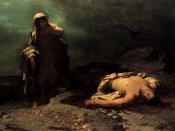Creon as Antigone's Tragic Figure In Sophocles' Antigone, Creon clearly fills the role of the tragic figure. He fits all seven of the traits of a tragic hero as defined by Northrop Frye. Two of these traits stand out especially; Creon's sense of commitment to his decision and his transfiguration after suffering the consequences of his actions.
Creon's decision to outlaw Polyneices's burial sets the stage for the tragedy that ensues. He regards Polyneices as an enemy of Thebes and sees no reason to honor his death. He remains dedicated to the decree in opposition to convincing arguments from Antigone, Haemon, and Teiresias.
The first and most passionate challenge brought against Creaon's edict comes from Antigone. Her blatant disregard of his orders stun Creon. He holds fast in his arrogance despite Atigone's protest: Antigone: It was not Zeus who published this decree, / Nor have the Powers who rule among the dead / Imposed such laws as this upon mankind; Nor could I think that a decree of yours - / A man - could override the laws of Heaven.
(ll. 450-454) Creon ignores the insight of her comment and likens Antigone to nothing more than a wild horse and a slave. (ll. 477-479) By disregarding her observation, he shows us that he truly does believe his word can refute that of the gods. He is set in his belief that his authority overrides the importance of spiritual tradition and divine order.
The second passionate challenge to Creon's decision is his own son. Haemon attempts to offer his father advice rather than directly challenging him, but a fierce argument ensues. Haemon acts as an advocate for himself, his fiancée, and the people of Thebes. He presents the most logical case for the reversing of Creon's dictum.
Haemon: The...


